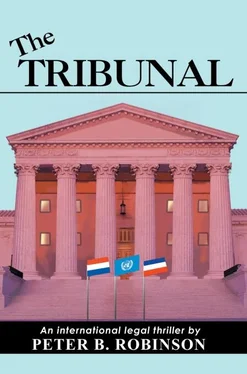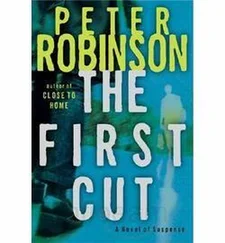Kevin thought of Ellen, and pictured her in some squalid house, chained to the walls – or worse. “I’m sorry. I guess I was clinging to the hope that there was some rational explanation for this and it could all be resolved.”
“What about those people from the Serbian Embassy?” Diane asked. “Have you checked them out?”
“Not yet. It’s a very sensitive thing to investigate someone from an Embassy. You remember that our Ambassador to Serbia and Montenegro was recalled when the U.N. people searched their Embassy here in The Hague.”
Kevin remembered that all too well. The U.N. police had searched this very house that night. “Well, what can we do?”
Detective Weber pulled out her tape recorder and another interview form with Miranda-type warnings. After Kevin signed it, she turned on the recorder and asked Kevin to recount his contacts with the people from the Embassy from his first visit to his latest telephone conversation with Zoran Vacinovic.
“Mr. Anderson,” Detective Weber said at the end of the questioning, “I have to ask this. You wouldn’t do something like this as a stunt to get some advantage in your trial, would you?”
“Absolutely not. I would never put my wife or daughter through this.”
“Will you give me our reports and those tapes?” Barnes asked.
“Yes, I will.”
“Can you get them now?” Barnes obviously didn’t want to take the chance of Kevin changing his mind.
Kevin got up from his chair. He began having second thoughts. The way Barnes had asked for them right after Detective Weber had challenged him had made Kevin reply quickly to clear his name. But what about his obligation to Draga? If he gave up the materials, he would have no way of proving that Draga had been helping the CIA and no way of helping Draga enforce his agreement.
As he went to retrieve the tapes and reports, Kevin hesitated. Why give the CIA the material if they could not help free Ellen? On the other hand, maybe the CIA had really kidnapped Ellen. If he gave them the reports, maybe they would release her, all the while denying that they had anything to do with her kidnapping.
Kevin’s instincts told him to just give over all the tapes and reports. He needed to stop playing games. He would do everything he could to free Ellen. Draga’s interests were just going to have to come second.
Kevin handed the reports and tapes to Barnes. “Please help my daughter.”
Barnes reached for the materials, but Detective Weber quickly snatched them from Kevin’s hand. “These may be needed as evidence in our kidnapping investigation,” she said to Barnes. “We’ll hold onto them for awhile.”
Barnes looked surprised, but said nothing.
Kevin was surprised and delighted. Now, he had the best of all worlds. He had shown his good faith by freely giving up the materials, but they were in the hands of someone who would not deny their existence if they were needed for Draga’s case.
“Do you have any other copies?” Barnes asked.
“No, they’re all there.”
“We’ll probably need to give you a lie detector test on that.”
“Fine.”
After Barnes had left, Kevin said, “I don’t know what to believe any more. I’m having a hard time with this.”
“We’re back to square one,” Diane said, crushed. “Who would want to kidnap our daughter?”
“Mr. Anderson, I’d like to have you take a lie detector test this morning,” Detective Weber said.
Kevin said nothing, wondering if he was now the prime suspect. “The quicker we erase any suspicions on you, the better.”
“Of course,” Kevin said. “I’m ready when you are.”
“Let’s go down to the Wassenaar Police Station and take care of that right now”
Kevin stood up and went to get his coat.
Detective Weber told Diane that she would have to answer the phone when it rang. Diane paled, then looked at Kevin. “Hurry back,” she said.
Kevin knew she didn’t want to be alone, and he felt terribly having to leave.
He kissed Diane goodbye, and went out the front door, followed by Detective Weber and another officer. A row of people with cameras lined the path between his house and the street. Lights went on and cameras flashed as Kevin stepped outside.
Reporters shouted questions in Dutch and English. Kevin didn’t respond, and Detective Weber led him straight to a police car parked in front. They got into the car and drove the six blocks to the Wassenaar Police Station. A procession of journalists followed in their own cars. More pictures were taken of Kevin going into the station.
“Is he being charged?” one reporter shouted.
“Is he being arrested?” asked another
The cloud of suspicion that seemed to hover over Kevin made him nervous. He knew that polygraph tests were not considered reliable enough to be used as evidence in court, and were a subjective tool that depended greatly on the experience and skill of the examiner.
Kevin sat down in a windowless room and listened as the middle-aged polygraph examiner explained the procedure for the test. The examiner seemed exact and cautious, two traits that Kevin appreciated. He carefully explained that after a series of innocuous questions to establish Kevin’s baseline readings, Kevin would be asked three relevant questions: Did he plan his daughter’s disappearance? Did he know who had his daughter? Did he, or anyone on his behalf, retain copies of the CIA reports or tapes?
The examiner attached wires to Kevin’s chest, arms, and fingers that would measure his breathing, pulse, and perspiration. The wires ran to a machine with a pen that moved up and down like a seismograph measuring an earthquake.
To fight his nervousness, Kevin kept silently repeating his mantra: “I have to help Ellen. I have to help Ellen…” He knew that if he remained a suspect, the police would divert valuable resources from the search for Ellen to an investigation of him. Things that should be done to try to find Ellen might not be done if they suspected Kevin.
The examination lasted an hour. By the end, a ream of paper had spilled onto the floor from the machine. When the examiner removed the wires from him, Kevin looked for some hint of how he had done. The examiner gave no clue. Kevin was exhausted, and anxious to get back home. He wondered if the kidnappers had called.
The examiner excused himself and took the papers with him as he left the room. Was it a bad sign that he had not told Kevin the results? Kevin was too tired to think it through. He felt like he was running on fumes.
After what seemed like another hour but was probably only fifteen minutes, the examiner returned to the room with Detective Weber. The examiner sat down across from Kevin and looked him directly in the eye. “You’re telling the truth.”
Kevin’s eyes teared up; he couldn’t help himself, the pent-up tension just poured out. In a few minutes, he went into the bathroom and washed his face. He looked like hell. His eyes were bloodshot. He felt unsteady; a touch dizzy. He knew he needed sleep.
When he got home, Kevin hugged Diane. “I passed their test,” he said.
“What took you so long?” Diane had never doubted Kevin would pass.
Kevin took her hand. “I have to get some sleep. I can’t think straight any more.”
Diane had been drinking coffee. “I can’t sleep while Ellen is out there. I’ll wait by the phone, you go up to sleep.”
Kevin trudged up to the second floor. He felt like he had just been hit by a truck. His head ached. His body was stiff. He took off his clothes, got under the covers, and closed his eyes. He was asleep in seconds.
When he awoke, it was 11 p.m. Diane was asleep beside him. Kevin felt rested, and anxious to hear any news. He got dressed, washed his face, and went downstairs. A young police officer was sitting in the living room near the phone, reading a book.
Читать дальше












